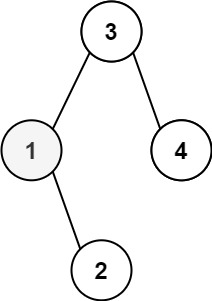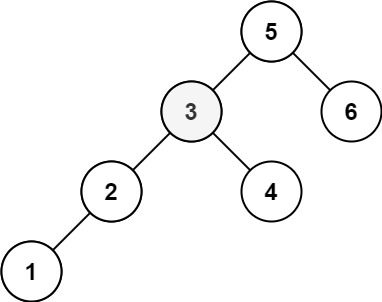LeetCode in Cpp
230. Kth Smallest Element in a BST
Medium
Given the root of a binary search tree, and an integer k, return the kth smallest value (1-indexed) of all the values of the nodes in the tree.
Example 1:

Input: root = [3,1,4,null,2], k = 1
Output: 1
Example 2:

Input: root = [5,3,6,2,4,null,null,1], k = 3
Output: 3
Constraints:
- The number of nodes in the tree is
n. 1 <= k <= n <= 1040 <= Node.val <= 104
Follow up: If the BST is modified often (i.e., we can do insert and delete operations) and you need to find the kth smallest frequently, how would you optimize?
Solution
/**
* Definition for a binary tree node.
* struct TreeNode {
* int val;
* TreeNode *left;
* TreeNode *right;
* TreeNode() : val(0), left(nullptr), right(nullptr) {}
* TreeNode(int x) : val(x), left(nullptr), right(nullptr) {}
* TreeNode(int x, TreeNode *left, TreeNode *right) : val(x), left(left), right(right) {}
* };
*/
class Solution {
private:
int k;
int count = 0;
int val;
public:
int kthSmallest(TreeNode* root, int k) {
this->k = k;
calculate(root);
return val;
}
private:
void calculate(TreeNode* node) {
if (node->left == nullptr && node->right == nullptr) {
count++;
if (count == k) {
val = node->val;
}
return;
}
if (node->left != nullptr) {
calculate(node->left);
}
count++;
if (count == k) {
val = node->val;
return;
}
if (node->right != nullptr) {
calculate(node->right);
}
}
};

